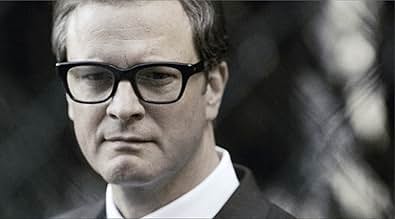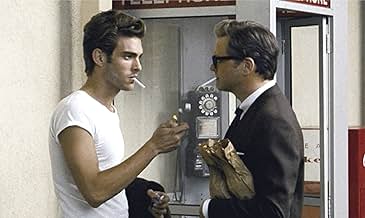An English professor, one year after the sudden death of his boyfriend, is unable to cope with his typical days in 1960s Los Angeles.An English professor, one year after the sudden death of his boyfriend, is unable to cope with his typical days in 1960s Los Angeles.An English professor, one year after the sudden death of his boyfriend, is unable to cope with his typical days in 1960s Los Angeles.
- Nominated for 1 Oscar
- 39 wins & 59 nominations total
- Director
- Writers
- All cast & crew
- Production, box office & more at IMDbPro
Storyline
Did you know
- TriviaOn February 21, 2010, when he won a BAFTA for Best Actor, Colin Firth's list of people to thank included the man who repaired his refrigerator. Firth explained that he'd decided to turn down the part, and had an email to director Tom Ford in his outbox, waiting to be sent. Then a man arrived to repair his refrigerator, and Firth had time to reconsider.
- GoofsSeveral fonts used did not exist in the 1960s. The university office door signs and the movie's titles use Gotham, introduced in 2000. The bank logo uses Trajan, created in 1989, and Gill Sans, popularized in the US in the 1970s.
- Quotes
George: [last lines; voiceover] A few times in my life I've had moments of absolute clarity, when for a few brief seconds the silence drowns out the noise and I can feel rather than think, and things seem so sharp. And the world seems so fresh as though it had all just come into existence. I can never make these moments last. I cling to them, but like everything, they fade. I have lived my life on these moments. They pull me back to the present, and I realize that everything is exactly the way it was meant to be.
- Crazy creditsThe production company, Fade to Black, is displayed in the opening, shown in white lettering outlined against a white background. It fades to white.
- ConnectionsFeatured in The Rotten Tomatoes Show: 2012/The Messenger/Fantastic Mr. Fox (2009)
- SoundtracksLe Serpent qui Danse
Lyrics by Charles Baudelaire
Music by Serge Gainsbourg
Performed by Serge Gainsbourg
Courtesy of Mercury France
Under license from Universal Music Enterprises
- albertodr07
- Sep 13, 2009
- Permalink
Details
- Release date
- Country of origin
- Languages
- Also known as
- Yolg'iz odam
- Filming locations
- Production companies
- See more company credits at IMDbPro
Box office
- Budget
- $7,000,000 (estimated)
- Gross US & Canada
- $9,176,000
- Opening weekend US & Canada
- $217,332
- Dec 13, 2009
- Gross worldwide
- $24,964,890
- Runtime1 hour 39 minutes
- Color
- Sound mix
- Aspect ratio
- 2.35 : 1
Contribute to this page







































